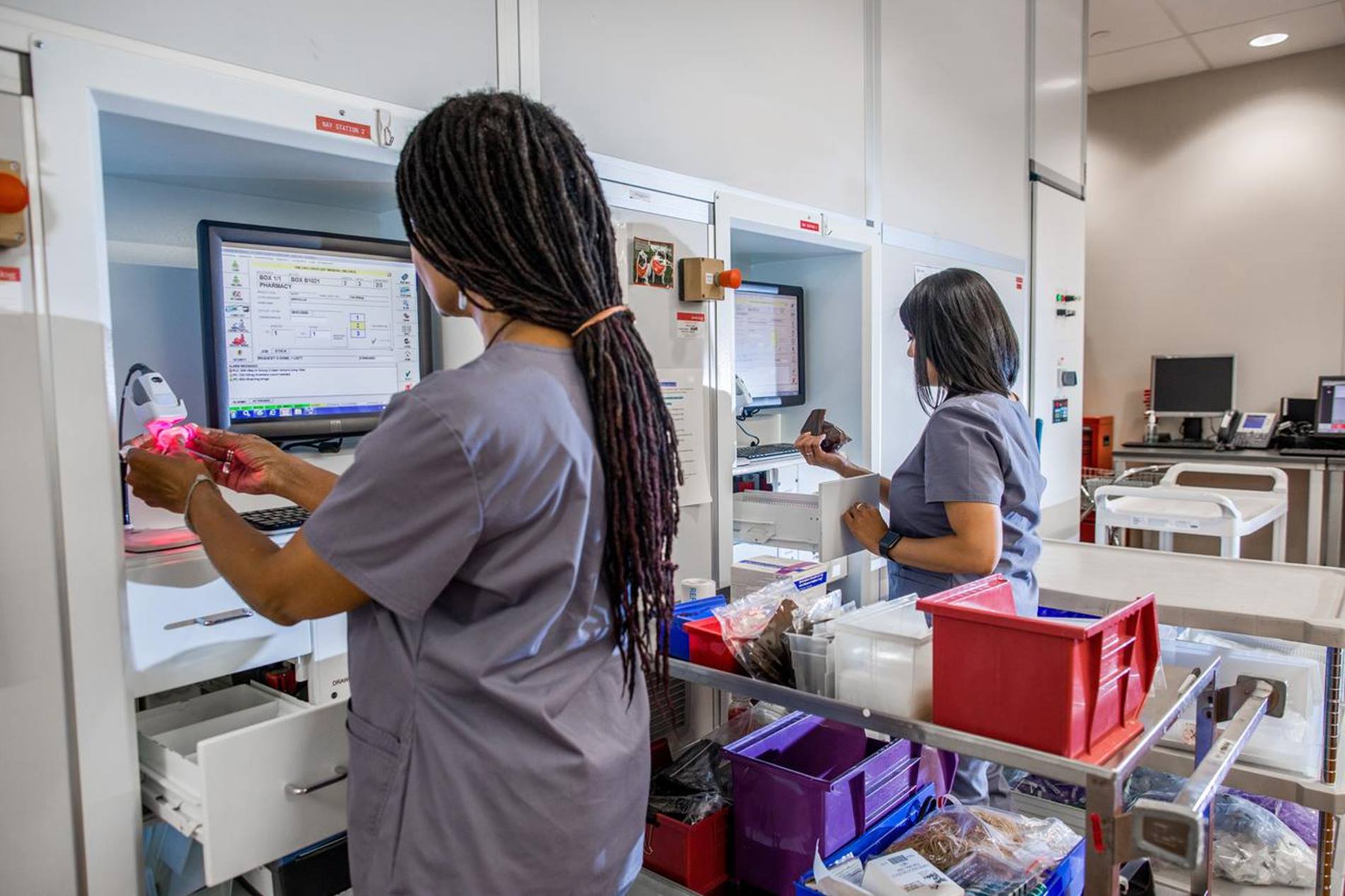Advances in pharmacy automation technology mean that some automation solutions can store, pick, package, and track thousands of medications per day. Therefore, the burning question of “Will pharmacists be replaced?” remains a primary focus for many currently in the field and those looking to become pharmacists. The short answer is not anytime in the near future.
Like commercial airline pilots, who’ve been using autopilot technology for nearly a century, healthcare’s inherently complex and psychosocial nature requires human oversight and operational systems require guidance. With that said, pharmacists are unlikely to be fully replaced by automation technology due to the following factors:
1. Clinical Decision Making
Pharmacists understand that each patient is different and that they require nuanced care. There’s certainly potential for Artificial Intelligence (AI) technology to help make suggestions, monitor drug interactions, and query complex medical history, but in the end the pharmacist will have to address the patient’s needs. That’s because AI technology — more specifically Large Language Models (LLMs) like ChatGPT — work by analyzing large data sets and generating responses based on complex probability models.
In other words, AI doesn’t “think critically” per se but rather generates based on what is most commonly and most likely to be a suitable answer to the prompt. It’s often correct or partially correct, but not 100% of the time — that’s where a pharmacist’s oversight is necessary. One study conducted by the University of Massachusetts in 2024 showed that LLMs “hallucinated” or provided inaccurate information in medical summaries in nearly every generation. Of the 50 generations produced by OpenAI’s Chat GPT-4o, researchers detected 327 medical event inconsistencies, 114 instances of incorrect reasoning, and three chronological inconsistencies.
“The most frequent hallucinations were related to symptoms, diagnosis and medicinal instructions, highlighting the fact that medical domain knowledge remains challenging to the state-of-the-art language models,” Prathiksha Rumale, a UMass graduate student and study contributor told MedCity News.
Finally, users without advanced clinical knowledge may not possess the pharmaceutical acuity to prompt an AI model correctly, leaving patients at risk.
2. The Human Touch
From patient education to building trust, humans can empathize, communicate, and interact with patients in a way that machines cannot. A person’s health is deeply personal, and among the most important aspects of their life. As such, providing a human connection isn’t just good business practice — it’s necessary as patients continually navigate increasingly complex treatments.
According to a 2022 survey performed by Columbia University’s Mailman School of Public Health, nearly 80% of patients view pharmacists as a key part of their healthcare team and depend on them for critical healthcare information.
“Most people trust pharmacists to play a greater role in providing their care. As the shortage of doctors and nurses persists, and as complex new therapies and digital health care technology solutions are developed, the role of the pharmacist will continue to evolve,” John McHugh, PhD, an assistant professor in the Department of Health Policy and Management at Columbia University Mailman School of Public Health told pharmacist.com.
3. Cross Department Collaboration
Healthcare is a coordinated effort. Many physicians, specialists, and other healthcare providers possess a great deal of pharmaceutical competence, but there are times when they must consult a pharmacist and discuss a patient’s unique situation, allergies, current medication use, or side effects. The pharmacist can then convey potential hazards, inherent risks, drug interactions, and alternatives that the physician may not be aware of or may have overlooked.
If this support is unavailable, the ramifications can be severely detrimental to the patient’s health. The National Institutes of Health states that “medication errors are the most common and preventable cause of patient injury” and that the World Health Organization ranks adverse events related to unsafe patient care as a top 10 cause of death and disability worldwide. As pharmaceuticals and treatments become more complex and sophisticated, the pharmacist plays an increasingly important role consulting with providers.
4. Legal and Ethical Concerns
Providing care comes with significant legal liability. Hospitals and health facilities are responsible for complying with all local and federal regulations, and they must make reasonable efforts to protect patients from harm.
Considering the risk that inherently comes with prescribing, filling, and administering medication, health facilities will reduce their legal liability by ensuring human oversight throughout the process.
From an ethical standpoint, the University of Washington’s Code of Ethics for Pharmacists (adopted by the American Pharmaceutical Association in 1994) states, among other things, that:
“A pharmacist respects the covenantal relationship between the patient and pharmacist. Considering the patient-pharmacist relationship as a covenant means that a pharmacist has moral obligations in response to the gift of trust received from society. In return for this gift, a pharmacist promises to help individuals achieve optimum benefit from their medications, to be committed to their welfare, and to maintain their trust.”
5. Compound Pharmacy and Special Pharmacy Requests
Compound requests occur when a patient needs a medication tailored to their particular needs. For instance, a patient may be allergic to certain ingredients contained within existing FDA-approved manufactured medications and need a compounded medication with a similar degree of efficacy.
The U.S. Pharmacopeia Convention (USP) officially defines pharmacy compounding as “the preparation, mixing, assembling, altering, packaging, and labeling of a drug, drug-delivery device,











